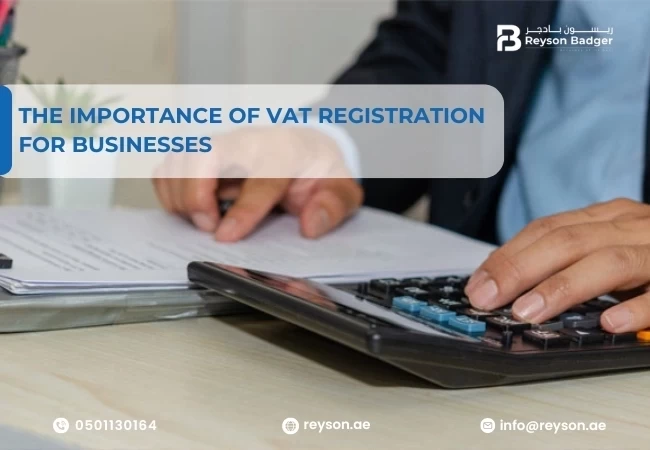The Importance of VAT Registration for Businesses
Written By Akshaya Ashok, Reviewed By Nouphal P C
Published on 18/11/2024

Value Added Tax (VAT) has transformed the tax landscape in the Middle East region, mainly the GCC countries. It has been initiated and aimed to diversify revenue streams and boost the economic growth of countries in the region. VAT is now an integral part of businesses, particularly since it is a kind of consumption tax charged on manufactured goods and other services. For this reason, VAT affects various kinds of businesses and many repeatedly fail or misinterpret the process of VAT registration. This blog demystifies the importance of VAT registration for businesses in terms of its benefits, consequences of not complying, and requirements. Understanding all these intricate details related to VAT registration allows it to become easier to find the right way forward in life, thus allowing businesses to ensure that they comply without any hitch, reduce risks, and drive optimum financial performance.
What is VAT Registration?
VAT registration is the process through which a business is registered with tax authorities for collecting and remitting Value Added Tax (VAT). Registration is usually compulsorily required by a business that receives any turnover above a minimum threshold set by a country. After one gets registered, a specific number known as VAT is assigned to the business, which then prints these numbers on all its VAT invoices and receipts issued. Generally, VAT registration is the process of compliance with tax laws because the businesses will recover the input VAT that has been incurred on their acquisitions. This minimizes the liabilities in taxes that they ought to pay.
How to Register Under VAT?
Registration under VAT necessarily is going to involve the following key steps:
- Eligibility Check: On whether the turnover of the business exceeds or meets the threshold laid down by the local law for VAT.
- Collect Information: Collect information about the business, including the name, address, nature of activities, and financial information.
- Application Form Completion: Filing up the application form for VAT registration through online application at the official website of the tax authority.
- Submission of Documents: Submission of necessary documents like proof of business identity, authentication of the address, and financial documents.
- Get a VAT Number: The business will be issued with a unique number known as the VAT number to be featured in all the applicable tax invoices.
- Install VAT Accounting: Ensure account provisions are developed to cover collection, retention, and return filing by periods.
- Returns filing: This has to be done as and when due to the appropriate tax authority by breaking the VAT collected from sales and that paid on purchases to the appropriate authorities.
Benefits of Registration under Voluntary VAT
Even though the Turnover of a business does not exceed the mandatory registration threshold, it may choose to register for voluntary reasons:
- Reclaim Input Tax: Voluntary registration of enterprises will recover VAT on inputs and thereby enhance their liquidity.
- Enhanced Credibility: VAT registration can enhance the credibility of a business among its customers and suppliers, showing that it is doing business properly.
- Competitive Advantage: Businesses can look more established and professional, which may attract more customers.
- Access to New Markets: Registration might make entry easier into new markets where VAT is likely to be complied with or required.
- Simplified International Trade: For businesses that deal in cross-border, being VAT registered simplifies compliance with international tax obligations.
Why is registration under VAT mandatory?
- Tax Laws and Regulations Compliance: VAT registration is important so that businesses comply with local tax laws. The non-registration of a business when necessary may lead to legal problems and certain penalties.
- Avoidance of Penalties and Fines: Failure to register for VAT when required can lead to severe penalties and fines from tax authorities. Without prompt registration, those risks are magnified.
- Ability to Reclaim VAT on Business Expenses: Registered businesses can reclaim VAT paid on their inputs (goods and services), effectively reducing their overall tax burden.
- Enhanced Business Credibility and Reputation: Registration for VAT helps in increasing the business’s creditability to customers as well as suppliers since the business is accredited by the government and complies with tax.
- Access to New Markets and Customers: Being VAT-registered may open up new market opportunities, particularly in regions where businesses are expected to comply with local tax laws.
Benefits of VAT Registration for Businesses
- Effective Management and Record-Keeping in Finances: VAT registration brings in the capacity to enhance the management of a firm's finances. The process requires that a business maintain record accounts for sales and purchases, hence encouraging better accounting practices that can eventually lead to more effective financial management. This structured follow-up enables it to track tax liabilities accurately and control cash flow better.
- Transparency and Accountability Increase: VAT registration promotes the transparency of business operations. There is a need to maintain detailed records of transactions, which can be an added advantage when there is an audit or inspection by tax authorities. This transparency creates confident relationships between the business and stakeholders such as customers, suppliers, and investors because it clarifies their commitment to regulatory standards.
- Better Cash Management: Of course, registering a business for VAT offers the possibility of inputting VAT claims. This is how input VAT received on purchases could improve cash flows greatly. Businesses can use input VAT to offset VAT collected from sales, thus better managing their cash reserves and planning future expenditures.
- Improves Competitive Advantage in the Market: VAT registration offers a competitive advantage by lifting up the reputation of a business. Most of the clients would prefer to have a VAT-registered supplier because it depicts compliance and seriousness about tax regulations and a commitment toward professionalism. The perception helps one get larger clients and new business opportunities.
- Unlocking Potential for Business Growth and Expansion: This would lead to improved economic growth by allowing the firm to make cross-border trade more effectively as a result of VAT registration. There is a necessity in many countries to have gotten registered, in order to get involved in foreign transactions. It simplifies international tax compliances as the business, thereby can approach new markets for operation and expand its area of operations without going through regulations.
Effects of Non-Registration
- Penalties and Fines: A company that fails to register for VAT upon necessitation may face severe penalties and fines set by the tax authority. Such financial recompense may press down on the resources of a business and impact its profitability as well.
- Loss of Business Credibility and Reputation: Non-registration under VAT can have a negative impact on a company's reputation. Customers and suppliers view non-registered companies as less believable or informal, maybe due to a serious loss in sales. In addition, this may end the relationship with suppliers.
- Missed Chances of VAT Recovery: Input VAT cannot be recovered on the purchase made by non-registered companies. Thus, it misses the saving opportunities. Hence, recovery of VAT raises the cost of production for a business and provides a lesser profit.
- Complexities while Accessing New Markets and Customers: Many of the larger clients or government contracts require suppliers to be VAT registered. The businesses may also not be able to venture into new markets or get contracts with recognized bodies without registration.
Who Needs to Register for VAT?
Explanations of VAT Registration Thresholds
The VAT registration threshold also varies from one country to another, though it is usually computed based on annual taxable turnover. For example, in the UK, the threshold is £85,000; in the UAE, it is AED 375,000, where businesses will automatically be required to register for VAT when their turnover exceeds the specified threshold for a certain period, (usually annually).
Businesses that Must Register for VAT
Generally, the following categories of businesses are obliged to register for VAT:
- Businesses with Turnover over Thresholds: Business enterprises whose taxable turnover exceeds the local registration threshold.
- Non-Resident Business: Organizations registered elsewhere selling goods or services in the jurisdiction may require registration, regardless of the level of turnover. Some industry-specific examples: The requirements could be specified for registration in such an industry even though the turnover is below the registration threshold, for example in some financial services.
- Voluntary VAT Registration for Small Businesses: Small businesses with less than the threshold of the statutory threshold have the option to register themselves. The above opportunity allows them to recover the input VAT charged on their purchases, increase their respectability to the customers, and potentially get large clients who would prefer to deal with registered suppliers.
Conclusion
VAT registration is vital for businesses in the UAE and GCC region. Accurate registration and compliance mitigate risks, reduce penalties, and enhance financial management. For expert VAT guidance, rely on Reyson Badger's seasoned professionals. Our team delivers personalized VAT solutions, ensuring seamless registration, returns, and audits. Safeguard your business. contact Reyson Badger to optimize VAT compliance and drive business success.

Written By
Akshaya Ashok
Akshaya Ashok is a content writer specializing in creating content focused on accounting and auditing. With over two years of experience, she has developed expertise in crafting professional content for the financial sector.

